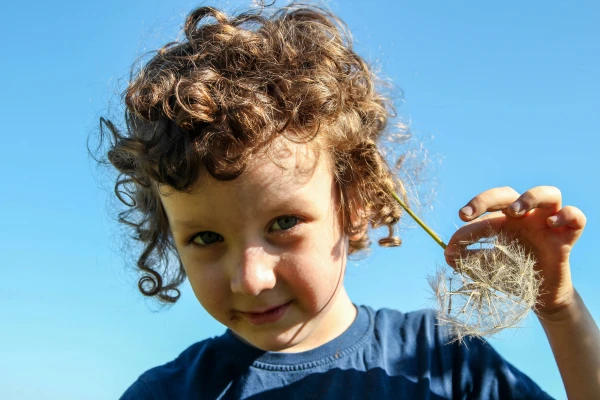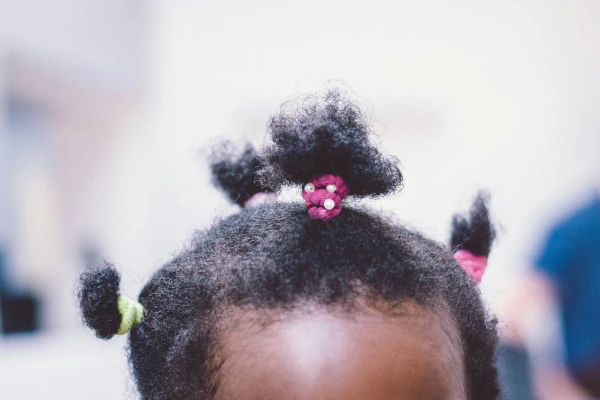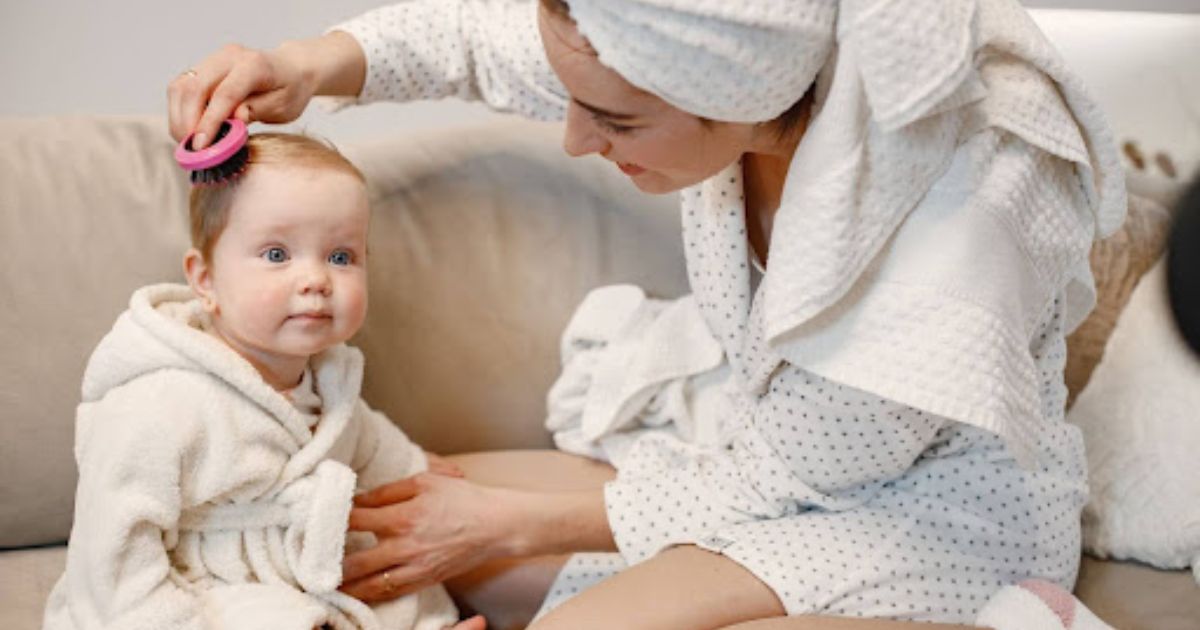Lice is something we try not to think about as parents. But when you think of head lice, you might envision school-aged children passing the pesky parasites amongst one another during class or recess.
However, an often-overlooked question that many new parents ask is, “Can babies get lice?” and if so, “What is the appropriate lice treatment for babies?” Protecting your newborn, and their scalp, is important for their overall health.
Fortunately, our lice experts are here to answer the question about whether babies can get head lice. This article aims to provide answers to those pressing concerns and offer guidance on tackling infant lice infestations.
Table of Contents
How Does Lice Spread?
Understanding the transmission dynamics of lice is essential for effective prevention. Lice primarily spreads through direct head-to-head contact, as they crawl from one person’s hair to another’s. Unlike some pests, lice cannot jump or fly, so their transfer depends on close proximity.
Additionally, while less common, the sharing of personal items such as hats, brushes, or headphones can also facilitate the spread of head lice. It’s worth noting that lice are not a result of poor hygiene; they are opportunistic pests that can infest anyone, regardless of cleanliness. By understanding how lice spread, one can more effectively mitigate the risks associated with infestations.
Can Lice Survive Without a Head to Live On?
Fortunately, head lice cannot survive long without a host to feed on. Within 24 hours the lice will die if they do not feed. However, this does mean that objects can be contaminated for up to 24 hours and should be avoided. This could include brushes, car seats or bus seats, and other locations where the lice are separated from their host.

Can Babies Get Lice?
The simple answer to the question “can babies get lice” is yes, babies can get lice. While it’s less common for infants to contract lice compared to older children, it is not impossible.
Babies can be exposed to lice from family members, caregivers, or any person who comes into close contact with them. Although lice are often associated with school-aged children (because they have more hair), babies are not immune. However, they are less frequently affected. Understanding the nature of lice, how they spread, and the unique circumstances surrounding babies can offer clarity.
Why Babies Might be Less Susceptible to Head Lice
While all age groups can potentially contract lice, certain factors render babies less susceptible to these pesky infestations.
Babies Have Limited Hair
Hair is where lice like to hang out, they cling to hair strands and lay their eggs (nits) close to the scalp. Since many babies have fine, sparse hair, it’s harder for lice to find a suitable environment. However, if your baby has more hair they might be at a higher risk of getting the parasites.
Scalp Temperature and pH Affect Lice
The scalp’s environment, including its temperature and pH, can affect lice. Fortunately, babies might have scalp conditions less conducive to lice infestation, although this doesn’t make them immune. You should still check your baby’s head to ensure that there are no unwelcome guests.
Less Interaction With Infected Individuals
School-age children spread lice quickly because they are often in close quarters and in contact with one another. Babies typically don’t have as much head-to-head contact as older children who might share headphones, and hats, or engage in close-contact play.
Parents have more control over who their baby has direct contact with, and this can limit the opportunities for lice to spread.

How Might Babies Contract Lice?
While babies are less likely to get head lice, they are not immune. Understanding the various ways through which babies might contract lice is crucial for effective prevention and prompt intervention.
Close Family Members Can Easily Spread Lice
If a sibling or parent has lice, a baby can get it from close contact, like cuddling. This is not uncommon which is why it is important for parents to frequently check all their children (and themselves) for lice.
Shared Items Can Spread Head Lice
Since lice can temporarily survive away from a host this means they can be on objects that your baby might come in contact with. Using contaminated combs, hats, pillows, or blankets can lead to an infestation.
Lice Can Spread at Daycares
While rare, if a baby is in a daycare where another child has lice, there’s a possibility of transmission. The more children there are, the more likely the chance of someone spreading head lice.
Head Lice Symptoms in Babies
Recognizing the subtle symptoms of head lice in babies is vital, as their symptoms can sometimes differ from those in older children or adults
Itching: This is the most common lice symptom, but babies can’t verbally express this. If a baby seems more irritable or is scratching their head, it might be a sign of lice.
Red Bumps: Bites from lice can lead to red bumps on the scalp, neck, and shoulders. When you see these on your child be sure to thoroughly check their scalp for the next few days.
Visible Lice and Nits: Adult lice are roughly the size of a sesame seed and are greyish-white or tan. Nits look like tiny yellow or brown dots before they hatch.

What To Do If My Newborn Has Lice: Lice Treatment for Babies
When it comes to the delicate and sensitive nature of an infant’s scalp, seeking professional care for lice treatment can be the most reassuring path for concerned parents. While there are numerous lice treatments available, entrusting your baby’s well-being to experts who specialize in treating infestations in infants ensures not only the effectiveness of the treatment but also the safety and comfort of your little one.
Professionals in this field are trained to handle even the tiniest of heads with the utmost care. Their vast experience means they can swiftly identify lice and nits, even in the finest baby hair, ensuring a thorough treatment process. Moreover, these lice experts stay updated on the latest research and safest methods, ensuring your baby is exposed to the least amount of risk possible.
Additionally, for many parents, the process of nitpicking can be tedious, overwhelming, and fraught with worry about whether every last louse or nit has been removed. Professional services eliminate this uncertainty, offering peace of mind that the infestation will be addressed comprehensively. They often provide follow-up checks to ensure the parasites don’t make a return.
Lastly, professionals can offer personalized advice tailored to your baby’s specific needs. From post-treatment care to preventive measures, these insights can be invaluable in ensuring your baby remains lice-free in the future.
Prevention: How to Keep Lice Away From Your Baby
Ensuring your baby doesn’t come into contact with lice in the first place is the best line of defense. By adopting proactive measures, you can significantly reduce the chances of an infestation:
Perform Regular Lice Checks
Before lice become a noticeable problem, they start as a few inconspicuous pests. Regularly inspecting your baby’s scalp can help detect and address an infestation early. Using a fine-toothed comb on damp hair can make these checks even more effective.
Limit Head-to-Head Contact
While your baby might not be engaging in play with peers, ensure family members, especially older siblings, are cautious about close contact if there’s a known lice outbreak in their environment.
Maintain Clean Surroundings
Regularly wash your baby’s bedding, soft toys, and clothes in hot water. For items that can’t be washed, sealing them in a plastic bag for 48 hours can help kill any lice.
Stay Informed About Infestations
If your baby attends daycare or has frequent interactions with groups of children, stay informed about any lice outbreaks. Prompt action can prevent your baby from becoming affected.
Educate Older Siblings About Head Lice
If you have older children, educate them on the importance of not sharing personal items like hats, brushes, and headphones with their peers. Help them understand the risks of lice and how to prevent getting them.
Use Natural Lice Deterrents
Some believe that using shampoos or sprays with tea tree oil or lavender can act as a lice deterrent. While not scientifically proven, it might be worth considering. Always ensure any product is suitable for a baby’s sensitive skin.
Prevention is the cornerstone of lice management, especially for infants. By staying vigilant and adopting these measures, you can provide your baby with a lice-free environment.
Get Professional Lice Treatment for Babies
In navigating the world of lice prevention and treatment, it’s paramount to align with trusted professionals who offer reliable treatment solutions. The Lice Clinics stands out in this domain, offering our signature heated air treatment—a groundbreaking method that guarantees complete lice removal without resorting to chemicals.
This state-of-the-art treatment ensures peace of mind for families and individuals. For those in South Carolina, our convenient locations in Greenville and Anderson make access to top-notch lice treatment just a short drive away.
For more information, please visit our website and schedule your lice treatment today.
